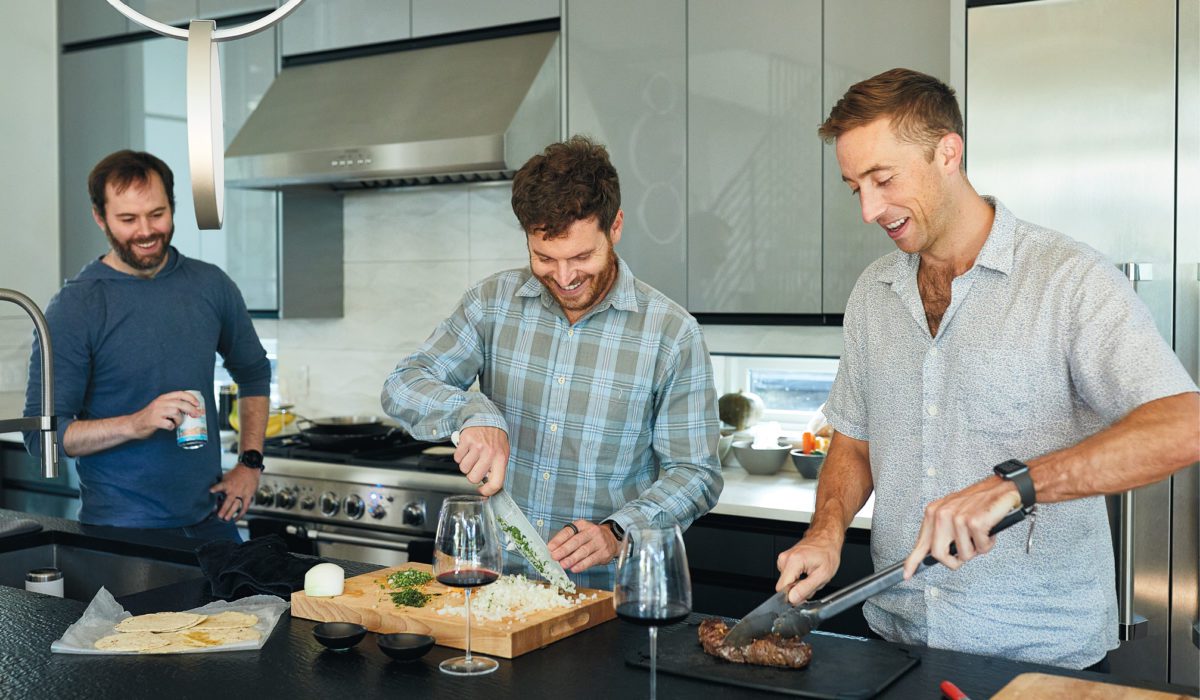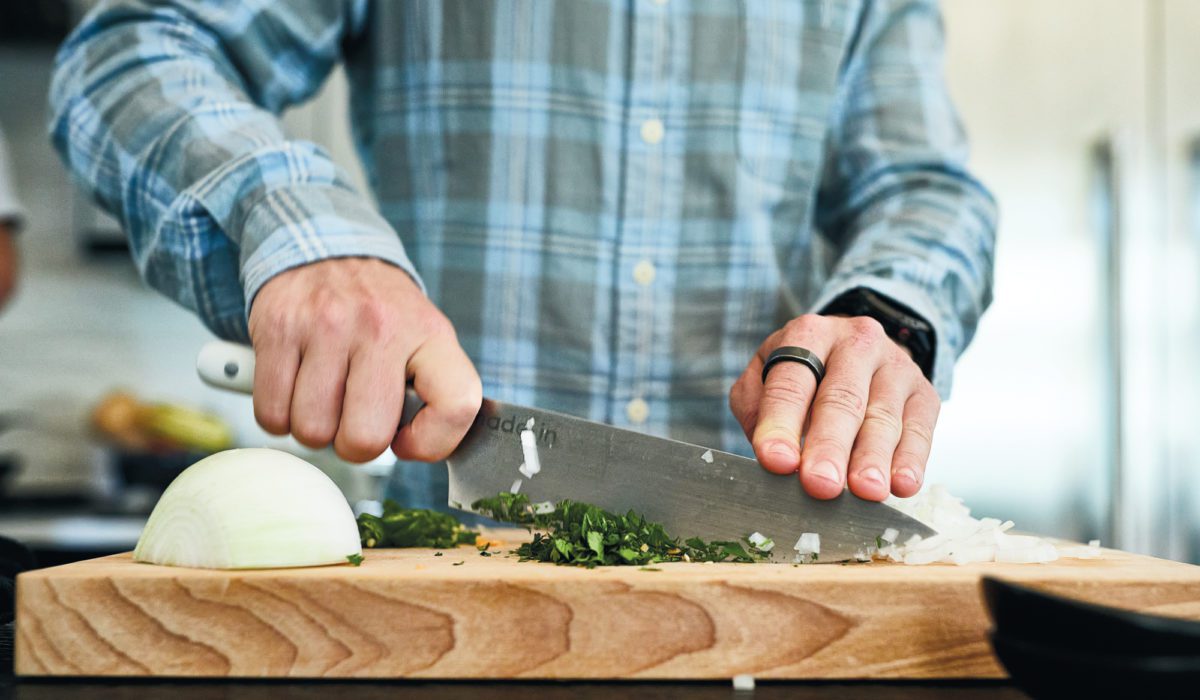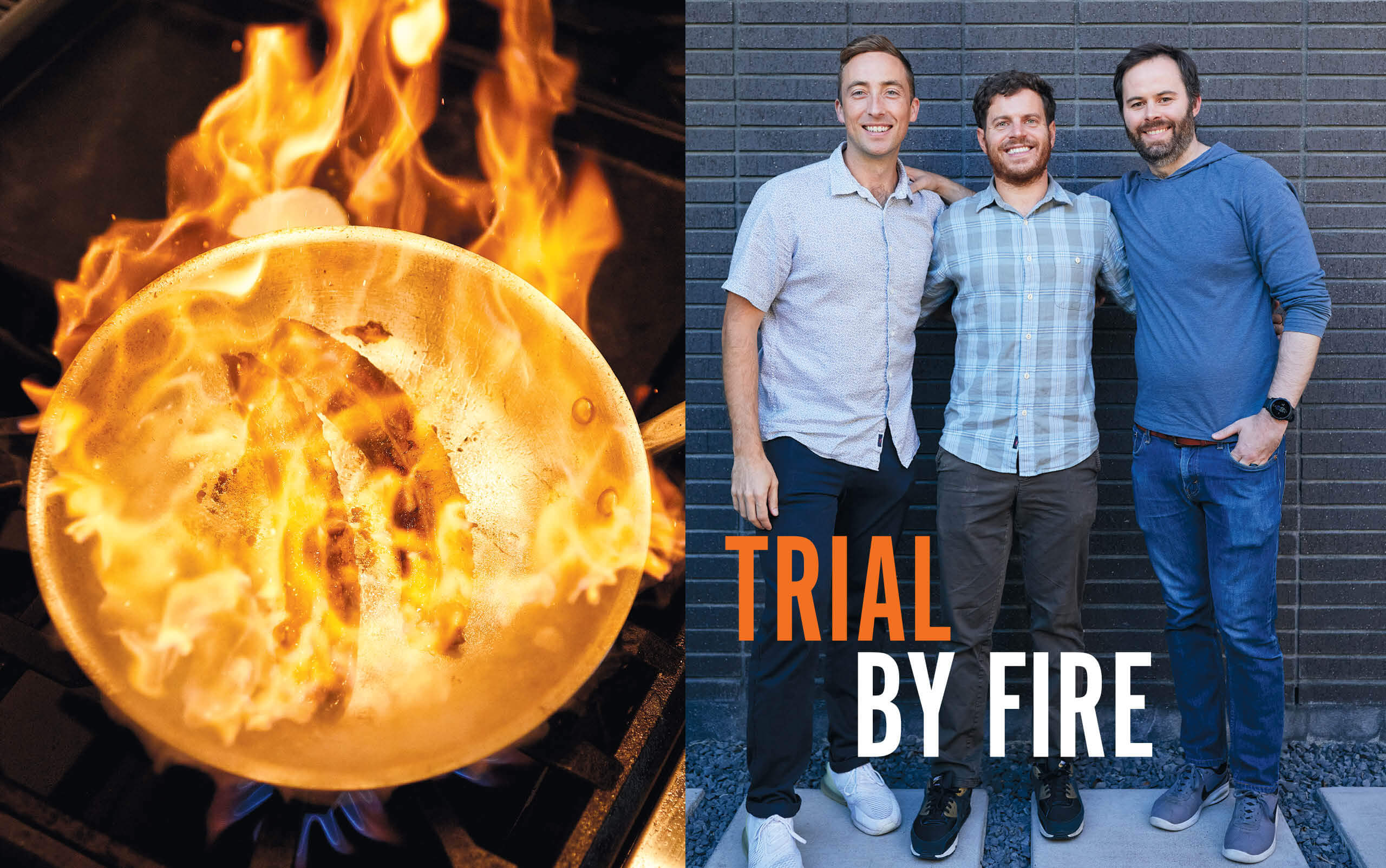Trio of alumni heat up cookware industry with direct-to-consumer brand
Six months after the 2017 launch of cookware company Made In, Chip Malt, MBA 15, and his co-founder, Jake Kalick, emailed a pitch deck to a dream collaboration partner: celebrity chef Tom Colicchio. “We didn’t hear back from him for two months, and it was a gut punch,” recalls Malt from the company’s home base in Austin, Texas. “Then we got an email saying, ‘Sorry guys, I was filming Top Chef and got a little behind, but I love everything you’re doing. Can you fly to New York tomorrow?’”
At the end of that half-hour meeting, Malt and Kalick had a new investor—and Made In had serious validation that its direct-to-consumer (DTC) alternative to the staid kitchenware industry was onto something big.
DTC companies like Warby Parker (eyewear) and BarkBox (pet supplies) are digital-first brands selling items consumers are accustomed to buying at a store or from a third-party wholesaler. By circumventing resellers, distributors, and retailers, DTC companies theoretically put higher-quality goods into consumers’ hands at a lower price. Malt had been intrigued by the model since joining Rhone Apparel while still studying at Haas, leading e-commerce and analytics efforts for the DTC men’s athleisure brand. “It seemed like every category had been taken down with the same story: sleepy industry, massive opportunity, retail focus, punchy brand,” Malt says. Except one.
In 2016, Malt sought Kalick’s reaction to the notion of a DTC kitchenware business. Kalick was his best friend of 30 years; his family had founded a cookware business in 1929 to outfit professional kitchens. “I knew how to build a digital brand,” says Malt. “Jake knew cookware, and after one phone call we were already at work on Made In.”
Cultivating Devotion
Made In faced a fundamental challenge at launch: getting customers to care about their pots and pans. “There was rising demand for cooking content from Food Network and Bon Appétit, and people were spending time sourcing quality ingredients. Then they’d come home and cook on a hand-me-down pan whose brand they couldn’t name,” Malt says. “There’s no other industry where people use a product so frequently yet have nearly zero brand affinity.”
So Made In’s founders communicated a message of authenticity, heritage, and quality to help buyers feel an emotional connection to the company and to the craftspeople behind the products. For instance, Malt says, “We went to the town in France that invented the modern chef knife and worked with a fifth-generation knife maker. We brought a camera crew so we could share the process of making a knife by hand.” Made In may be the only cookware company with a wooden spoon origin story featuring a Hungarian spoon man.

Having Colicchio’s imprimatur also helped Made In’s kitchenware get adopted in multiple three-Michelin-star restaurants, including Chicago’s Alinea and New York City’s Le Bernardin. Demand was quadrupling year over year, and by 2019, it was clear that Made In needed specialists in supply chain and finance. Malt turned to classmates Chad Brinton and Matt Gunderson, MBA 15s, for help.
Assembling Experience
Brinton, who focused on supply chain management at Haas, is Made In’s vice president of operations. He was working for Walmart and jumped at the chance to work with Malt. Gunderson, Made In’s vice president of finance, was winding down his third year at Personal Capital and planning his next move. They became employees #7 and #8.
For Brinton and Gunderson, much of their roles involved formalizing and systemizing their respective departments—even if those were one-person departments at the outset. Brinton’s corporate experience has proved invaluable. “My time after Haas was spent seeing how organizations at scale are able to build and maintain a global supply chain,” Brinton says. “Walmart had a fantastic approach to focusing on the customer experience when making key decisions that I’ve carried into my role at Made In.”
There was rising demand for cooking content from Food Network and Bon Appétit, and people were spending time sourcing quality ingredients. Then they’d come home and cook on a hand-me-down pan whose brand they couldn’t name. There’s no other industry where people use a product so frequently yet have nearly zero brand affinity.
—Chip Malt, MBA 15
Gunderson points out that he and Brinton often work at cross purposes. “Chad wants as much product on hand as possible, and I want to spend as little money as possible. So we took time in the early days learning each other’s roles to prevent shortsighted decision-making, and that’s helped a lot.”
Navigating the Pandemic
Malt characterizes 2020 as a transformative year for the company. The pandemic lockdown allowed home cooks time to experiment and scrutinize their kitchen tools. The company rolled out new products like glassware, flatware, tableware, copper cookware, and new knife shapes. Made In’s 2020 revenue multiplied by a factor of five over 2019 levels, and employees rose from 10 to 40.

At the same time, global disruption of supply chains hit hard, shutting down their French and Italian manufacturers for a time and impeding the flow of raw materials from China. “It forced us to think of more creative ways to operate, like selling shelf-stable meal kits,” Brinton says.
Today, Made In continues to innovate. Its latest product collaboration is a first-of-its-kind French porcelain baking slab developed with famed chef Nancy Silverton. The bakeware, which is part baking dish, part sheet tray, sold out in hours.
While rave reviews from professional and home chefs is gratifying, Malt points to another, more elusive marker of startup success—team dynamics. “We have just as many bad days as we do good days,” he says. “Having a good group of friends and colleagues with whom you can be honest and commiserate as buddies when you’re solving problems has been awesome.”
